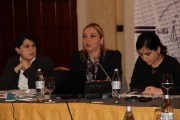
GYLA held presentation of the monitoring report of pre-election environment, election day and post-election period
GYLA held presentation of the monitoring report of pre-election environment, election day and post-election period. The report covers results of the monitoring conducted in April 1-July 22, 2014 period.
The report describes in details irregularities revealed within pre-election campaign, during election day and in the course of calculating results. Further, it proposes concrete recommendations that will assist individuals involved in election process to eliminate the gaps.
According to GYLA’s assessment, the June 15, 2014 elections were distinguished for high competitiveness and more problems as opposed to the 2013 Presidential elections.
GYLA observed pre-election campaign, as well as election day, repeated elections and the second tour of mayor’s/gamgebeli’s elections. On June 15, 2014, at the polling day, GYLA’s 500 election monitors observed up to 40 election districts in Tbilisi and regions.
In pre-election period violations, such as pressure on alleged candidate, attack of political opponents, interference in pre-election campaign and physical attack, were frequent. Such facts impaired pre-election environment and jeopardized conduct of election campaign in free and competitive election environment.
Prior to elections, GYLA assessed conduct of pre-election campaign in two mid-term reports, where it revealed violations of that period. Information was periodically submitted to relevant agencies.
According to GYLA’s assessment, the June 15, 2014 elections were conducted in a peaceful environment and voters had opportunity to exercise their suffrage without restriction. It should be noted that gross violations were not recorded massively, though some key incidents were observed and this caused conduct of repeated election in some precincts. GYLA’s observation revealed low level of qualification and unprofessional approach to the issue from the side of commission members. At the polling day, GYLA’s observers submitted 150 complaints in district election commission and recorded 127 remarks in a log book.
In the districts were GYLA’s observers implemented monitoring, it was revealed that DECs, save for some exceptions were not inclined to study details of complaints submitted by GYLA, to examine important circumstances of the case and study/assess evidences. Although in concrete cases irregularities were underpinned with relevant evidences, district election commissions did not satisfy claims and in some cases even refused to accept evidences. Following elections, GYLA submitted 262 pieces of complaints in CEC, 58 pieces of lawsuits in the first instance court, and challenged 21 cases in the appellate court. From complaints submitted in district election commissions, DECs satisfied fully 95 complains and partially 68 complaints. From 58 lawsuits submitted in courts 4 were satisfied completely and 20 partially.
Problems and irregularities revealed during the June 15 local self-government elections were still topical during the second tour of mayor’s/gamgebeli’s elections. Though, compared to the first tour of elections, at the second tour district election commissions responded adequately on remarks of GYLA’s observers and corrected procedural violations immediately in majority cases. That was the reason why GYLA’s observers refrained from submitting complaints in number of cases. At the second tour GYLA’s observers drafted total of 43 complaints and registered 34 remarks in a log book.
GYLA remains hopeful that the report will assist individuals involved in election process to reinforce their achievements and eliminate gaps that will promote conduct of elections in a better, more transparent and fair environment.
Implementation of GYLA’s monitoring mission became possible with financial support of OSGF, NED and USAID. Opinions expressed in the report belong to GYLA and may not necessarily express opinions of donor organizations.
ჯ. კახიძის #15, თბილისი, საქართველო, 0102 ; ტელ: (995 32) 95 23 53; ფაქსი: (995 32) 92 32 11; ელ-ფოსტა: gyla@gyla.ge; www.gyla.ge
15, J. Kakhidze str. 0102, Tbilisi, Georgia. Tel: (995 32) 95 23 53; Fax: (995 32) 92 32 11; E-mail: gyla@gyla.ge; www.gyla.ge


